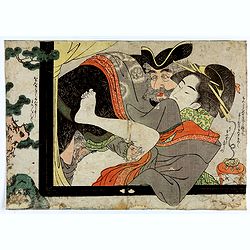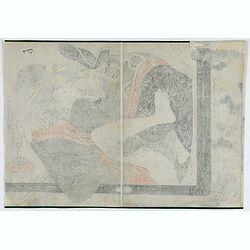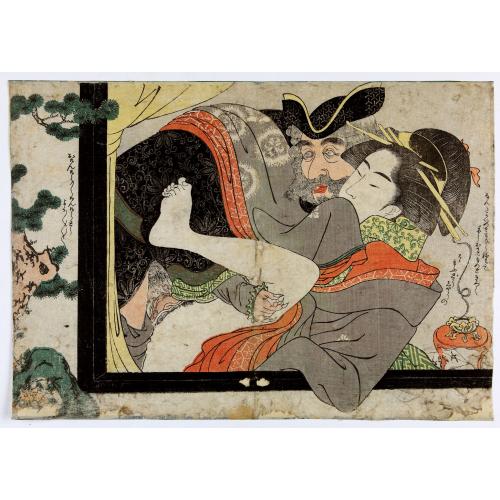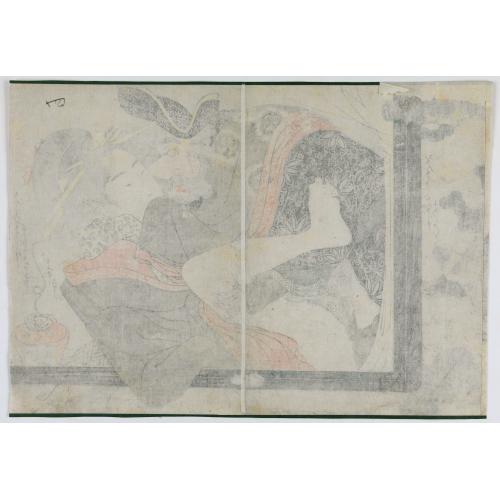Description
An explicit scene of a Dutchman and a Maruyama prostitute featuring a gray-bearded westerner coupling with a courtesan.
The woman protests that she doesn't understand what the foreigner is saying, but demands that he "Push! Do it harder!.
The man, gripping her thigh, responds to her entreaties with a stream of gibberish, "Oken, kera, kera, kenkera tou yoka yoka yoka"
Behind him, to the right, an incense burner in the background has been interpreted to mean that the Dutchman had a rancid odor that needed to be covered up.
The pleasure quarter of Maruyama was itself a tightly controlled district within the larger tightly controlled world of Tokugawa Japan, presided over by the shogun, whose chief political goal, aside from remaining in power, was to prevent a recurrence of the civil war and disorder that had prevailed in Japan before the Tokugawa clan came to power.
The first pleasure quarter in Japan is supposed to have been created early in the seventeenth century, when Toyotomi Hideyoshi, the most powerful of Japan's feudal lords, allowed a favored servitor to establish a brothel, known as Yanagimachi, or "Willow Town," not far from the shogun's palace. At the same time, largely through the influence of a kimono-clad troupe of female dancers led by one Izumo no Okuni, a legendary figure of Japanese cultural history, Kabuki theater came into being along the banks of the Kamo River in Kyoto.
Eventually, in order to keep the temptations of the pleasure quarter distant from the capital itself, the district of brothels, teahouses, and The Inescapable Courtesy of Japan theaters were moved farther south, to what became the famed Shimabara pleasure quarter, which was, in turn, a model for the Maruyama pleasure quarter Nagasaki familiar to the Dutch, In 1661, a writer named Asai Ryoi gave the whole establishment the name by which it has been known ever since, ukiyo, or "floating world, the idea being that since life is transient and fleeting, it ought to be spent in refined hedonism.
That the Dutch were enthusiastic participants in this floating world, which was entirely absent from their native country, is well established. Evidence includes a Dutch-Japanese phrase book from about 1770, compiled for the owner of the Ebi-ya, an inn in Kyoto where the Dutch delegation stayed on its annual pilgrimage from Nagasaki to that city, seat of the shogunate.
Eight of the book's eighty short phrases have to do with hiring the services of women, as in this exchange:
Do you like that girl?
Yes, I like her a great deal.
Would you like me to make appropriate arrangements:
Yes, please do
Understood.
Dutch pleasure-seeking was itself a matter of some titillation for local people, who are depicted in any number of Japanese woodblock prints of the eighteenth and nineteenth centuries flocking to get a glimpse of the strange foreigners on one of their excursions to the Maruyama brothels.
The above print from the 1790s by the celebrated artist Chokosai Eisho depicts a Dutchman, recognizable by his black triangular hat and curly muttonchops and beard, with his penis well inserted into the vagina of a Maruyama courtesan.The inscription has the courtesan complaining that she doesn't understand a word of what the Dutchman is saying, even as she instructs him to "push-do it harder!"
Such scenes, whether accurately depicted or not, were repeated over the next two hundred years as the Dutch maintained their Japanese trading monopoly.
Reference: Encounters, Jackson and Jaffer, 14.2
The woman protests that she doesn't understand what the foreigner is saying, but demands that he "Push! Do it harder!.
The man, gripping her thigh, responds to her entreaties with a stream of gibberish, "Oken, kera, kera, kenkera tou yoka yoka yoka"
Behind him, to the right, an incense burner in the background has been interpreted to mean that the Dutchman had a rancid odor that needed to be covered up.
The pleasure quarter of Maruyama was itself a tightly controlled district within the larger tightly controlled world of Tokugawa Japan, presided over by the shogun, whose chief political goal, aside from remaining in power, was to prevent a recurrence of the civil war and disorder that had prevailed in Japan before the Tokugawa clan came to power.
The first pleasure quarter in Japan is supposed to have been created early in the seventeenth century, when Toyotomi Hideyoshi, the most powerful of Japan's feudal lords, allowed a favored servitor to establish a brothel, known as Yanagimachi, or "Willow Town," not far from the shogun's palace. At the same time, largely through the influence of a kimono-clad troupe of female dancers led by one Izumo no Okuni, a legendary figure of Japanese cultural history, Kabuki theater came into being along the banks of the Kamo River in Kyoto.
Eventually, in order to keep the temptations of the pleasure quarter distant from the capital itself, the district of brothels, teahouses, and The Inescapable Courtesy of Japan theaters were moved farther south, to what became the famed Shimabara pleasure quarter, which was, in turn, a model for the Maruyama pleasure quarter Nagasaki familiar to the Dutch, In 1661, a writer named Asai Ryoi gave the whole establishment the name by which it has been known ever since, ukiyo, or "floating world, the idea being that since life is transient and fleeting, it ought to be spent in refined hedonism.
That the Dutch were enthusiastic participants in this floating world, which was entirely absent from their native country, is well established. Evidence includes a Dutch-Japanese phrase book from about 1770, compiled for the owner of the Ebi-ya, an inn in Kyoto where the Dutch delegation stayed on its annual pilgrimage from Nagasaki to that city, seat of the shogunate.
Eight of the book's eighty short phrases have to do with hiring the services of women, as in this exchange:
Do you like that girl?
Yes, I like her a great deal.
Would you like me to make appropriate arrangements:
Yes, please do
Understood.
Dutch pleasure-seeking was itself a matter of some titillation for local people, who are depicted in any number of Japanese woodblock prints of the eighteenth and nineteenth centuries flocking to get a glimpse of the strange foreigners on one of their excursions to the Maruyama brothels.
The above print from the 1790s by the celebrated artist Chokosai Eisho depicts a Dutchman, recognizable by his black triangular hat and curly muttonchops and beard, with his penis well inserted into the vagina of a Maruyama courtesan.The inscription has the courtesan complaining that she doesn't understand a word of what the Dutchman is saying, even as she instructs him to "push-do it harder!"
Such scenes, whether accurately depicted or not, were repeated over the next two hundred years as the Dutch maintained their Japanese trading monopoly.
Reference: Encounters, Jackson and Jaffer, 14.2
FAQ - Guarantee - Shipping
Buying in the BuyNow Gallery
This item is available for immediate purchase when a "Add to Cart" or "Inquire Now" button is shown.
Items are sold in the EU margin scheme
Payments are accepted in Euros or US Dollars.
Authenticity Guarantee
 We provide professional descriptions, condition report (based on 45 years experience in the map business)
We provide professional descriptions, condition report (based on 45 years experience in the map business)
Paulus Swaen warrants the authenticity of our items and a certificate of authenticity is provided for each acquired lot.
Condition and Coloring
We indicate the condition of each item and use our unnique HiBCoR grading system in which four key items determine a map's value: Historical Importance, Beauty, Condition/Coloring and Rarity.
Color Key
We offer many maps in their original black and white condition. We do not systematically color-up maps to make them more sellable to the general public or buyer.
Copper engraved or wood block maps are always hand colored. Maps were initially colored for aesthetic reasons and to improve readability. Nowadays, it is becoming a challenge to find maps in their original colors and are therefor more valuable.
We use the following color keys in our catalog:
Original colors; mean that the colors have been applied around the time the map was issued.
Original o/l colors; means the map has only the borders colored at the time of publication.
Colored; If the colors are applied recently or at the end of the 20th century.
Read more about coloring of maps [+]
Shipping fee
A flat shipping fee of $ 30 is added to each shipment by DHL within Europe and North America. This covers : International Priority shipping, Packing and Insurance (up to the invoice amount).
Shipments to Asia are $ 40 and rest of the world $50
We charge only one shipping fee when you have been successful on multiple items or when you want to combine gallery and auction purchases.
Read more about invoicing and shipping
FAQ
Please have a look for more information about buying in the BuyNow gallery
Many answers are likely to find in the general help section.
Virtual Collection
![]()
With Virtual Collection you can collect all your favorite items in one place. It is free, and anyone can create his or her Virtual map collection.
Unless you are logged in, the item is only saved for this session. You have to be registed and logged-in if you want to save this item permanently to your Virtual Collection.
Read More[+]
Register here, it is free and you do not need a credit card.
Add this item to
Virtual Collection
or click the following link to see my Virtual Collection.
| Digital Image Download | |
|
Paulus Swaen maintains an archive of most of our high-resolution rare maps, prints, posters and medieval manuscript scans. We make them freely available for download and study. Read more about free image download |
In accordance with the EU Consumer Rights Directive and habitually reside in the European Union you have the right to cancel the contract for the purchase of a lot, without giving any reason.
The cancellation period will expire 14 calendar days from the day after the date on which you or a third party (other than the carrier and indicated by you) acquires, physical possession of the lot. To exercise the right to cancel you must inform Paulus Swaen Inc, of your decision to cancel this contract by a clear statement (e.g. a letter sent by post, or e-mail (amsterdam@swaen.com).
To meet the cancellation deadline, it is sufficient for you to send your communication concerning your exercise of the right to cancel before the cancellation period has expired.



